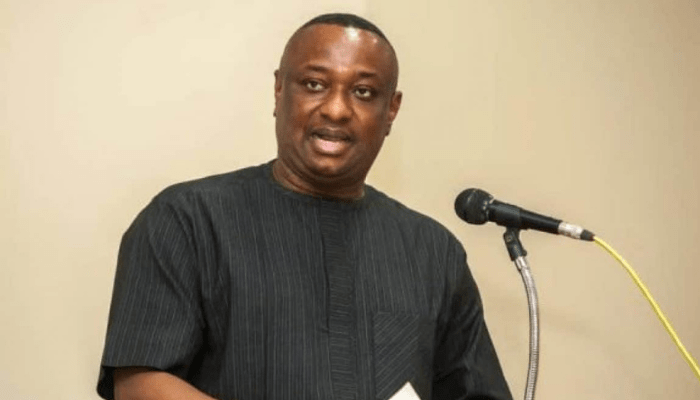President Muhammadu Buhari is currently under fire over the pardon granted former Governors Jolly Nyame and Joshua Dariye.
The duo, who were jailed for corruption, were pardoned at a Council of State meeting on Thursday.
- Pardon all thieves in Prison, Falana knocks Buhari over Dariye, Nyame
- Thanks for pardoning Dariye, Nyame, Ortom tells Buhari
The development had sparked outrage, with human rights lawyer, Femi Falana, asking Buhari to pardon all thieves in prison.
Nine years ago, ex-President Goodluck Jonathan, who attended the meeting where the former governors were pardoned, was under the hammer over a similar pardon granted to Diepriye Alamieyeseigha, a former governor of Bayelsa State.
Human rights lawyer, Festus Keyamo, who is a member of Buhari’s cabinet, was among those who attacked Jonathan over the pardon, which was also on the advice of the Council of State.
Keyamo, who is now Minister of State for Niger Delta Affairs, had said it typified the height of insensitivity of the Jonathan government to the feelings of Nigerians about the war against corruption.
He had said, “It is shocking, confusing and disheartening that at a time when the general mood of the country indicates that the war against corruption is insincere, slow and a sham, the President deems it fit to even rubbish the very little work that has been done by the anti-corruption agencies in securing the conviction of these individuals.”
“It is also disturbing that at a time when Nigeria is still ranking very low in the Corruption Perception Index of Transparency International the President has further damaged the image of the country by this singular act.”
He had said the pardon taught no bitter lesson to thieving and corrupt public officers, but encouraged corruption at the highest and the lowest levels of public office, adding that the decision itself “is corruption per excellence.”
“I condemn it; I condemn it and I condemn it,” the lawyer had said in a statement.
Nuhu Ribadu, pioneer Chairman of the Economic and Financial Crimes Commission (EFCC), had said the pardon was the “the final nail” in the coffin for fighting corruption in the country.
Soyinka described it as a bad example

On his part, Nobel Laureate, Prof. Wole Soyinka, had described the act as both a corrupt act and an example of state impunity.
“On the state pardon granted the former governor, I want to join the bandwagon of the ignorant persons. I am happy to be counted among them. For me, this kind of impunity is not unconnected to the controversy which has been surrounding the N4bn allocation being sought by the First Lady Mission. It is part of the same corrupt mentality.
“What is going on right now gives the picture of a government that is floundering and justifying the unjustifiable. It amounts to encouragement of corruption. The United States Government wants the felon. We have a case of an officer of the law – a governor – who went to another country and broke the law of the nation. He jumped bail.
“I believe that such a person does not deserve a state pardon. So, I have joined the league of the ignorant persons condemning the act. I criticise and deplore President Jonathan for granting pardon to the former governor,” he had said.
Jonathan’s spokesman, Reuben Abati, had said those criticising the immorality of the pardon were suffering from “sophisticated ignorance”.
But in his new book, “My Transition Hours”, Jonathan explained that the decision to pardon Alamieyeseigha was reached by his predecessor, Umaru Yar’Adua, who could not announce it before he died.
Yar’Adua died on May 5, 2010, and Jonathan stepped in as Acting President.
He was elected president in 2011 and served until 2015 when he lost reelection to Buhari.
Who is Alamieyeseigha?

Alamieyeseigha was a former governor of Bayelsa State. He was twice elected governor – 1999 and 2003 – but was impeached in 2005. Jonathan, who was his deputy, became governor from 2005 till 2007 when he was nominated the running mate of Yar’Adua in 2007.
He was detained in London on charges of money laundering in September 2005. At the time of his arrest, Metropolitan police found about £1m in cash in his London home. Later they found a total of £1.8m ($3.2m) in cash and bank accounts.
He was found to own four homes in London reportedly worth £10 million. He jumped bail in December 2005 from the United Kingdom by allegedly disguising himself as a woman, though Alamieyeseigha denied the claim.
Alamieyeseigha was impeached on allegations of corruption on December 9 2005. On July 26, 2007, he pleaded guilty before a Nigerian court to six charges and was sentenced to two years in prison on each charge. He died on October 10, 2015 after he had been pardoned.

 Join Daily Trust WhatsApp Community For Quick Access To News and Happenings Around You.
Join Daily Trust WhatsApp Community For Quick Access To News and Happenings Around You.


